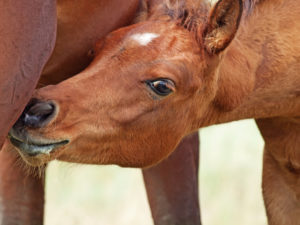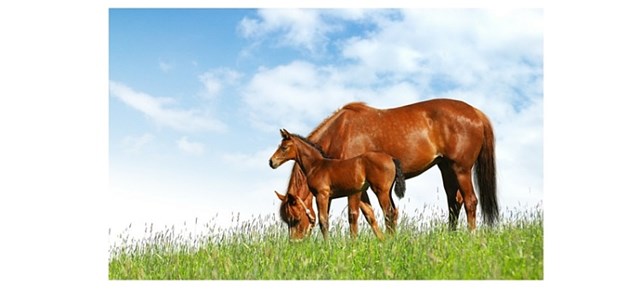By Matt McMillan, Ph.D., Equine Nutritionist, Hi-Pro Feeds
As breeding season for mares comes to a close, many considerations should be taken into account so that live, healthy foals can be produced in the springtime next year. When compared to other farm animals, mares have one of the lowest reproductive efficiencies. The major reasons for this low reproductive performance tend to include disease, parasite infestation, uterine infections, irregular reproductive cycles, and poor nutrient management. Through proper vaccination schedules, internal parasite control, good veterinary care, and proper nutrition, many of these factors effecting poor reproductive performance can be greatly reduced and potentially eliminated.
Optimum vaccination and parasite control programs for broodmares vary according to regional and farm disease prevalence, economics, and managerial practices. The goal of such programs is to prevent infectious and parasitic diseases not only in the mares but also in the foals. By maximizing colostral antibodies produced in the milk and reducing internal parasites in the mare, happy and healthy foals can be produced allowing them the opportunity to maximize their genetic potential. To determine the best preventative program, it is advised to consult with a local veterinarian so that reproductive efficiency of the broodmares can be maximized and foals can be produced and raised most effectively.
Uterine infections and irregular reproductive cycles in mares are challenges that equine veterinarians deal with every breeding season. Through proper medications, hormone treatments, and/or therapy, many of these conditions can be treated successfully and a healthy live foal can still be produced. Once again, consultation with a local veterinarian should occur especially if there is some suspicion of an infection or irregular cycle.

Proper nutrition is essential in the broodmare through pregnancy, foaling, and lactation. It is important for mare owners and managers to understand that nutrient requirements in the broodmare change drastically throughout the cycle. One of the biggest mistakes that mare owners and managers tend to carry out is to over-feed the mare in the first eight months of pregnancy. This, many times, causes mares to become obese which in turn creates a strain on the mare by applying too much weight to her frame. Mares in this stage of pregnancy actually have the same nutrient requirements as mature horses at maintenance and should be fed similarly. Conversely, when mares enter the ninth month of pregnancy, fetal growth begins to significantly increase. In this last stage, eighty percent of fetal growth will occur. As with all stages of pregnancy and lactation, it is essential that nutrient requirements are met so that a healthy foal will arrive. Upon foaling, nutrient requirements once again increase due to the beginning of lactation. Feeding should be adjusted accordingly so that it is certain that all nutrient requirements are being met.
During late pregnancy, the mare’s dietary energy needs increase progressively 10 to 20% and further increase 80% during lactation. As a result, mares will eat more if made available. If more feed or energy is not consumed, this may decrease milk production and reproductive efficiency, which could lead to several problems. However, it is important to note that simply feeding more may not be adequate. Aside, from additional energy needs, there are also additional protein, calcium, phosphorus, etc., needs for proper fetal development and high quality milk production. These needs are actually greater than the amount of additional energy needed and are extremely important. By increasing the amount being fed may not provide the additional nutrients necessary for proper growth and development if a good feeding program is not in place.
To ensure nutrient requirements are being met in all stages of pregnancy, lactation, and growth, it is important to feed a good quality forage source in adequate quantities while providing a high quality fully fortified feed to promote health, growth, and to ensure genetic potential in the foal. To determine a proper diet for the broodmare in all stages of life, go to Our Equine products page. Here you will find high quality, fully fortified feeds that are available to be utilized in a ration provided by the Microsteed™ Wizard. The program is located on the Equine Products page. Find and click on the link entitled “Is your horse getting the nutrients it needs?” for a free diet evaluation. Through use of the Microsteed Wizard, you can develop diets to ensure that all nutrient requirements are being met in all stages of life for your horse.
Proper management of the broodmare is essential in the maintenance of her health, as well as the growth and development of the young horse she is raising. Good communication with a veterinarian and a good feeding program are essential to happy and healthy mares and foals.

